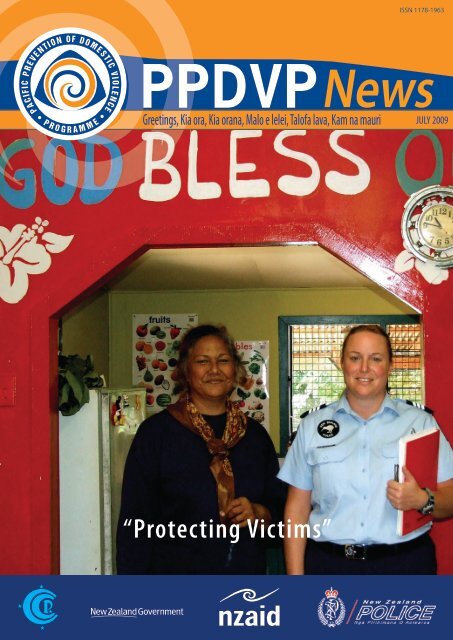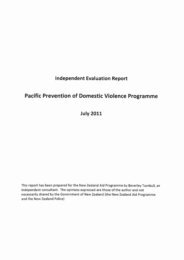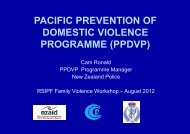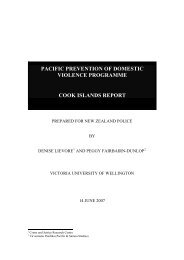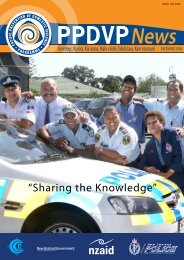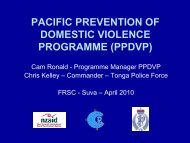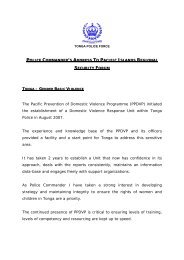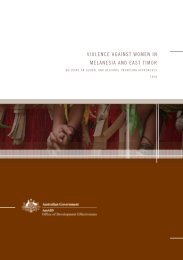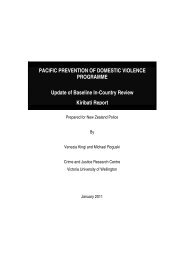July 2009 - Pacific Prevention of Domestic Violence Programme
July 2009 - Pacific Prevention of Domestic Violence Programme
July 2009 - Pacific Prevention of Domestic Violence Programme
- No tags were found...
Create successful ePaper yourself
Turn your PDF publications into a flip-book with our unique Google optimized e-Paper software.
Participating CountriesTongaThe PPDVP in Tonga is progressing in leaps and bounds. Theprogression <strong>of</strong> the programme has coincided with the appointment<strong>of</strong> Commander Chris Kelley. With his full support Tonga Police Force isdealing with all domestic violence incidents with a new passion.My last deployment into Tonga was in May <strong>2009</strong> where InspectorTony Wakelin, Senior Sergeant Dave Ryan and I delivered a two weekdomestic violence ‘Train the Trainer’ package to 16 enthusiastic police<strong>of</strong>ficers. These <strong>of</strong>ficers were selected from all the Policing Districtsthroughout Tonga.A number <strong>of</strong> them have also been chosen to hold the <strong>Domestic</strong><strong>Violence</strong> portfolio within their police stations on their return.The course went extremely well. The <strong>of</strong>ficers who attended not onlylearnt a lot about domestic violence but the majority <strong>of</strong> them are nowable to deliver the same package to <strong>of</strong>ficers in their home stations.Tonga now has an <strong>of</strong>ficer who holds the <strong>Domestic</strong> <strong>Violence</strong> portfolioin every station on Tongatapu and in all districts on the outer islands.This is a first for the Tonga Police. The <strong>of</strong>ficers who were selected totake on this role have been chosen wisely. They are all dedicated inmaking victims safe and all <strong>of</strong>fenders accountable.During this deployment I was invited along with Cam Ronald to attendtwo Committee meetings. The first <strong>of</strong> these was with the TongaPolice National <strong>Domestic</strong> <strong>Violence</strong> Committee. This committee wasinstigated by Commander Kelley and includes within its members allthe Police District Commanders throughout Tonga as well as AssistantCommander Tupouniua, the Executive Sponsor <strong>of</strong> the National<strong>Domestic</strong> <strong>Violence</strong> Unit within Tonga, and Commander Kelley.The national committee discusses domestic violence incidents thathave occurred in each district and ensures that all incidents are beingappropriately responded to by the Tonga Police Force.The second committee was the National <strong>Domestic</strong> <strong>Violence</strong>Committee. This is another initiated by Commander Kelley.It includes within its membersrepresentatives from NGO’s andGovernment Departments withinTonga. The committee purpose isto provide a national oversight ondomestic violence Police policy,legislation and Police practice.With Commander Kelley’s supportTonga Police has also adopted a “no drop” rule towards all <strong>of</strong>fencesthat are related to domestic violence incidents. All <strong>of</strong>fences arenow being prosecuted and are not be withdrawn without theCommander’s approval.This includes cases that involve victims recanting their complaint andnot wanting to provide evidence in court. The Tonga Police view nowis that other evidence besides the victim’s complaint can be presentedto the Court to prove the <strong>of</strong>fence.There is considerable support and strong partnerships that the<strong>Domestic</strong> <strong>Violence</strong> Unit (DVU) has formed with a number <strong>of</strong> NGOswithin Tonga. Without the fantastic work that these agencies areperforming, the <strong>Domestic</strong> <strong>Violence</strong> Unit would not have progressed inthe manner in which it has.In particular the National Centre <strong>of</strong> Women and Children is workingclosely with each member <strong>of</strong> the DVU and has adopted a reciprocalreferral system <strong>of</strong> all victims reporting domestic violence abuse.This system ensures the victims receive full support. All referrals arediscussed at a weekly meeting attended by both organisations wherethey discuss, plan and action issues from each meeting. This attemptsto ensure the continual safety <strong>of</strong> each victim.In the future other agencies will also be in a position to attend andcontribute to these weekly meetings.Detective Haley RyanTonga MentorDetective Haley Ryan4Participants <strong>of</strong> the training held in Tonga.
Tongan Police Committed to addressing domestic violenceA strong commitment to reducing the impact <strong>of</strong> domestic violence in Tonga has been made bythe Tonga Police. Police Commander Chris Kelley told the recent Train the Trainer programmethat violence is not acceptable.Commander Kelley has been consistent in delivering this message on behalf <strong>of</strong> all theTonga Police, firstly at the White Ribbon Day ceremonies on 25 November 2008 and at otheropportunities since then.During the May training programme Tongan media organisations took the chance to publicisethe training and to see it in progress. The Commander held a briefing with the PPDVP<strong>Programme</strong> Manager, Cam Ronald, and Assistant Police Commander Itu Tupouniua who is theexecutive level sponsor <strong>of</strong> the domestic violence activities in the Tonga Police. Itu describedhow the police have established coordinators in each police district and outer islands, to ensurethat a consistent approach is taken across all <strong>of</strong> the community in how the police respond tothese crimes. She emphasised the multi agency approach that was being developed, especiallywith the established NGO’s already working with women and victims in Tonga.Tongan Police Commander Chris Kelleyaddresses the graduating trainees.<strong>Programme</strong> Manager Cam Ronald outlined how the PPDVP was working with the Tonga Police to support their initiative through thedelivery <strong>of</strong> training programmes, as well as the chance to see how others worked through study tours and programmes linked withpacific countries and with New Zealand.Late last year the head <strong>of</strong> the Tonga Police <strong>Domestic</strong> <strong>Violence</strong> Unit, Detective Sergeant Seteone Poutele, joined 11 others from across thepacific to work with New Zealand Police staff, the Courts, and a range <strong>of</strong> organisations and agencies in how they responded to domesticviolence cases. These lessons have now been applied in Tonga.“There is a strong partnership between the Tonga Police and the NGO’s in Tonga, especially the Tongan Centre for Women and Children,as well as others like the Lifeline and the Salvation Army,” Cam said. “This guarantees that everyone is working together to protectfamilies and making sure that the best possible solution is found to their problems.”“The <strong>2009</strong> Tongan Police Strategic Plan will focus on Community Reassurance; Policing with Confidence; and OrganisationalDevelopment. One <strong>of</strong> our key activities will be our response to violence and especially domestic violence. Everyone will have a part inthis, and will be led by the coordinators completing their training today,” said Commander Kelley.Tonga Training – The VictimsAs part <strong>of</strong> the Tonga Police <strong>Domestic</strong> <strong>Violence</strong> Investigation Training theparticipants visited at the safe house operated by the Tongan Centrefor Women and Children. The house had recently been spruced up by aNew Zealand Rotary Club and the facilities now available to victims andtheir families are excellent.Possibly the main lesson was the need for the Police to be clear in theirminds that they had to put aside their personal beliefs, including thenatural desire to build and maintain families, and to enforce the law toensure that victims were protected from further harm.The course members were sincerely appreciative to “M” and the others atthe safe house.One <strong>of</strong> the victims staying at the safe house who we shall call “M” agreedto describe her case to the police staff. She sat with her counsellorand outlined her experiences over many years and the various violent<strong>of</strong>fending that had taken place. This <strong>of</strong>fending led to one particularincident which had caused “M” to seek help from the Centre and to takea prosecution against her husband.“M” described the emotions, feelings, fears and experiences that shehad been through. She also spoke <strong>of</strong> the lead up to the court case,the defended hearing and the pressures that this brought to her, hercounsellor and to others that were supporting her.Police staff were able to ask questions and to discuss her situation withhelp from her counsellor and others from the centre. This led to a veryrespectful, but comprehensive debate, on many <strong>of</strong> the long held beliefsby the members and how these related to the specific case <strong>of</strong> “M”.The Executive Director Ofa-Ki-Levuka Guttenbeil Likulikuk, "M" and a Tonganpolice <strong>of</strong>ficer at the safe house.5
Participating CountriesCook IslandsThe <strong>Domestic</strong> <strong>Violence</strong> Unit is now a standard part <strong>of</strong> policing for the Cook Island’s Police. It is situated withinthe Family Services Group which includes Youth Aid and now reports to the Operations Inspector to reinforceits front line response.Constable Pauline Rangi is now well established in her role as the O/C <strong>of</strong> the <strong>Domestic</strong> <strong>Violence</strong> Unit.She supports front line staff in domestic violence matters, maintains the domestic violencedatabase that provides vital information to the intelligence unit and will be a subject matter expertin her role. During her first week in the job Pauline was thrown in the deep end with a call fromPunanga Tauturu saying they needed some help with a New Zealand tourist domestic violenceincident. Pauline did the formal interviews, took ownership <strong>of</strong> the file and did what she expectsall front line staff should do in such incidents. She did an excellent job and proved to herselfthat the process works. It also gave her first hand experience <strong>of</strong> completing what is requiredfrom first call for service to entering into the database.Mr John RobinsonThis incident also shows the development <strong>of</strong> the relationship between Punanga Tauturu andthe Cook Island Police that they both have confidence in each other to work closely together Pauline Rangi working her way through a file.with victims to ensure they get good outcomes. The Cook Islands Northern Group <strong>of</strong> police <strong>of</strong>ficers underwent community policing trainingin Rarotonga which includes options for preventing and responding to domestic violence in the outer islands. The PPDVP mentor and Paulinepresented to this group as well. Future plans include maintaining the standards developed, increasing community awareness <strong>of</strong> the issues bothon Rarotonga and the outer islands and establishing a government response to the consequences <strong>of</strong> this crime.Mr John RobinsonCook Islands MentorSamoaParticipating CountriesNine mentor deployments have occurred in Samoa since the inception <strong>of</strong> the <strong>Pacific</strong> <strong>Prevention</strong> <strong>of</strong> <strong>Domestic</strong><strong>Violence</strong> <strong>Programme</strong>. Within that time the Ministry <strong>of</strong> Police & Prison Services <strong>Domestic</strong> <strong>Violence</strong> Team or‘Vaega O Sauaa I Totonu O Agia’ has also grown and now accommodates nine full time <strong>of</strong>ficers in one <strong>of</strong> theadjoining buildings behind Apia’s main station.While the team is focusing on the recording and appropriate resolutions<strong>of</strong> matters <strong>of</strong> domestic violence, the major focus in Samoa this year willbe centred on whether or not the ‘Family Safety Bill’ currently in draftformat, is passed in Parliament later this year.Inspector Karen SmithSamoa is now able to provide at least two <strong>of</strong>ficers on 24-hour coveragefor domestic violence matters. The proactive arm <strong>of</strong> the team is alsounder development to ensure consistent delivery <strong>of</strong> all domestic violencetraining to colleagues in general policing and specialised areas.All new recruits receive domestic violence training The DV unit deliversawareness training around domestic violence in conjunction withcommunity policing and or NGO’s to the villages and schools in Samoa.The biggest challenge for the members <strong>of</strong> the <strong>Domestic</strong> <strong>Violence</strong> Team stillremains in terms <strong>of</strong> meeting the needs and expectations <strong>of</strong> the community.Inspector Karen SmithSamoa Mentor6Pictured from left to right: Constable Misipele, Constable Mulivai,Corporal Moefetu, Constable Usufono, Constable Johnny, Constable Feagai,Constable Vaalele & Constable Iosefatu (Absent: Constable Fono).
Participating CountriesKiribatiI was last in Kiribati in February and as is usual I was pleased to returnand catch up with colleagues and friends.Thet first thing that struck me was the energy and excitementin addressing family violence shown by the team at the FamilyAssistance and Sexual Offences Unit (the FASO). The <strong>of</strong>fice had a smartand pr<strong>of</strong>essional appearance and there was a determination from theteam to involve themselves in cases and issues facing the communityaround domestic violence.A big thank you to Sergeant Okky and her team. I know that KimBloomfield had some very favourable comments to make about thespeed with which the team learnt the new reporting system.required to return with an oval ball.Given the coral sand I suspect tacklerugby is going to struggle. In theheat touch rugby is challengingenough – especially for this chap.One <strong>of</strong> the key events was aSenior Sergeant James Soleworkshop for middle managerswhere we worked on the beginnings <strong>of</strong> a strategic plan for the KPS. Itwas a process I thoroughly enjoyed. We took the step <strong>of</strong> introducingour ideas and learnings from police services from New Zealand, otherSouth <strong>Pacific</strong> countries and the rest <strong>of</strong> the world. The choice was thenleft to the workshop to decide if they wanted or needed a strategicplan. They endorsed the need and we began a process <strong>of</strong> healthydebate and discussion.The recent launch <strong>of</strong> theGender Based <strong>Violence</strong> andChild Abuse survey resultshas produced a desireamongst the communityand in particular the Policeto address this importantsocial issue. The supportand backing <strong>of</strong> ActingCommissioner Iotita isappreciated by the mentorand PPDVP and hasprovided the necessaryleadership to move forward.We know this is a sensitive issue to discuss and is easily left to beconsidered ‘family business.’ We also know that no citizen <strong>of</strong> Kiribatishould live a life <strong>of</strong> fear or abuse – particularly in their own home.Acting Commissioner Iotita put it very well when he spoke to theNCOs who attended the workshop to increase their learning andunderstanding <strong>of</strong> investigating domestic violence by referring to thesurvey. “We must be worried and concerned, given the core functions<strong>of</strong> the Police are preserving peace, law and order. That includes thePolice’s obligation to ensure that the people are safe and secure bothat home and in the street.”The O/C Tarawa wore a white ribbon to the same ceremony and spoke<strong>of</strong> its significance to policing.The first week saw me working with the NCOs at a workshop at thePolice Training School. We had some excellent discussions aroundleadership and responsibilities for NCOs to role model the correctbehaviours in all areas <strong>of</strong> their working and home life. The feedbackwas positive and I look forward to them working alongside FASO andCommunity Policing to address <strong>Domestic</strong> <strong>Violence</strong> in Tarawa and theOuter Islands.Sergeant Jim Sole with Kiribati Police members who attended the workshopWe took time out to play the ‘Frigates’ v ‘Kiwi’s’ soccer match - whichturned into a game <strong>of</strong> touch rugby. They have the bug now and I amFor me the highlight was thedevelopment <strong>of</strong> the KPS Vision.It linked in key elements <strong>of</strong> thosematters that are so important toKiribati. These were brainstormedby the participants. I believe theunanimous feel <strong>of</strong> the group wasthat they had developed a ‘vision’they were justifiably proud <strong>of</strong>.VisionCurrent KPS Vision: A modern,proactive and responsive police agency providing quality policeservices to the community <strong>of</strong> I Kiribati.KPS <strong>Domestic</strong> <strong>Violence</strong> Strategy Vision: Kiribati homes free <strong>of</strong> domesticviolence where families are happy, healthy, prosperous, living in peaceand are supportive <strong>of</strong> each other and their communities.Te Utu ae kakukurei bon mwengan te I-Kiribati ae akea te kiriwe iai, emarurung raoi ba e boutokaaki iai te tangira, te aroaro ma te reitaki aetamaroa iroura n tatabemaniira nako ma te botan aomata inanon TeMauri, Te Raoi ao Te Tabomoa.(English Translation): Happy family is the home <strong>of</strong> I Kiribati, free <strong>of</strong>violence, healthy supported by love, good relationships with eachother, within the community through health peace and prosperity.Acting Commissioner Iotita Kuarawete and Sergeant Okoro Iuka wereinvited to attend as observers, at the Regional Advisory Committee(RAC) meeting held in Fiji.AC Kuarawete gave a very good presentation on the state <strong>of</strong> theKiribati Police in general and an overview <strong>of</strong> all statistics downloadedfrom the CMIS database on <strong>Domestic</strong> <strong>Violence</strong> Incident reports thatthe FASO unit has dealt with since being set up in 2006.Sergeant Jim SoleKiribati Mentor7
Participating CountriesVanuatuVanuatu’s current population <strong>of</strong> around 223,000, <strong>of</strong> whom around75-80% live in the outlying villages and islands and rest in thecapital centre <strong>of</strong> Port Vila makes for a very interesting outlook onmentoring Police.The primary focus is on working alongside the Port Vila Central Policeand seeing any positive work ‘mushroom’ from this core approach,”says Senior Sergeant Alan McGlade.This was Alan’s second deployment to the country. “The challengesfacing Vanuatu have some great potential and this gives me plenty <strong>of</strong>opportunity to provide guidance, assistance and advice.”One <strong>of</strong> the key issues is the introduction <strong>of</strong> the new Family ProtectionAct <strong>2009</strong>. This piece <strong>of</strong> legislation has taken around ten years to finallymake its way into law and the very traditional values held by many <strong>of</strong>the population has resulted in some strong opposition to the act.The whole approach to this legislation is very similar to the responseto the New Zealand “Crimes (Substituted Section 59) AmendmentAct 2007” (Anti-smacking legislation), and it has generated significantand fairly ‘healthy’ debate around the whole topic <strong>of</strong> abuse. Althoughthe legislation is now ‘cemented’ the actual enforcement <strong>of</strong> the lawis a whole new challenge and there is much to do to make this veryvaluable piece <strong>of</strong> legislation work Some great opportunities existto provide good quality training for Police, judicial agencies andcommunity groups over the coming months.The Family Protection Unit currently consists <strong>of</strong> a Detective SeniorSergeant Davis Saravanu, Detective Sergeant Jeanne Thomasand Detective Redford David. One <strong>of</strong> the most exciting projectscurrently in progress is the development <strong>of</strong> the new Police FamilyProtection Unit <strong>of</strong>fice on the CID floor <strong>of</strong> the Port Vila Police station.All the necessary planning has taken place and as soon as the PoliceCommissioner has signed <strong>of</strong>f our MOU we will be in a position to getstarted on the new <strong>of</strong>fice renovations.The current Family Protection Unit(FPU) is similar to NZ Child and AdultSexual Abuse Teams in that theycome under the CID and their focusis the investigation <strong>of</strong> all sexualabuse cases. With the involvement <strong>of</strong>the PPDVP we will be creating a new<strong>Domestic</strong> <strong>Violence</strong> InvestigationTeam who will become part <strong>of</strong> the current FPU. The investigationteams are excited and very positive about the developments with thegroup. They will benefit from working alongside NZ Police who havealready developed systems and processes in this very area and canprovide some timely and valuable guidance and training in this field.As a result <strong>of</strong> a recent crime prevention conference Police havelaunched a new National Crime <strong>Prevention</strong> Committee led bySuperintendent Daniel Rakau and guided by the Capacity BuildingProject. This committee is made up <strong>of</strong> government and nongovernmentagencies and meets regularly to look at all aspects<strong>of</strong> crime prevention initiatives and a wide range <strong>of</strong> systems andprocesses where improvements could be made. It is early days for thecommittee but again this has great potential.This year will see the retirement <strong>of</strong> the current Police Commissionerand a new senior <strong>of</strong>ficer take his place. On behalf <strong>of</strong> NZ Police, Alanpassed his best wishes to the Commissioner on his retirement aftermany years <strong>of</strong> commitment to the Police.“Aside from the project work and daily challenges that we work withoverseas this is such a great opportunity for me to visit and be part<strong>of</strong> such a different culture and to be welcomed into the country toexperience Policing in a completely different environment.”.Senior Sergeant Alan McGladeVanuatu MentorSenior Sergeant Alan McGladeNational Crime <strong>Prevention</strong> Coordinators, Superintendent Daniel Rakau andothers.The Family Protection team.8
Link countriesSolomon IslandsIn February this year PPDVP’s Reserve mentor, Inspector Dave Ryan travelled to Honiara, and was met by theConstable Merrin Dancy (Minnie) who is currently deployed in Solomon Islands through RAMSI. Merrin holdsthe portfolio <strong>of</strong> the PPDVP advisor with the Solomon Islands Police Force.Constable Dancy who is deployed in this role for a year has established some excellent relationships with theChristian Care Centre, NGO’s and other groups involved with DV <strong>Prevention</strong>. She is a well respected member <strong>of</strong>the <strong>Domestic</strong> <strong>Violence</strong> <strong>Prevention</strong> group in Honiara.Inspector Dave RyanThe Solomon Islands Police Commissioner has appointed several<strong>Domestic</strong> <strong>Violence</strong> Coordinators in each <strong>of</strong> the provinces. Theseare part time positions and during the next 12 months they willbe assisted in building a local action plan to suit their local needs.Inspector Ryan attended the training for the <strong>Domestic</strong> <strong>Violence</strong>Coordinators undertaken by Staff Sergeant Tuhaika Temangutaua(Morris) and Sergeant Stanley Riolo <strong>of</strong> the Royal Solomon IslandPolice (RSIP), on <strong>Domestic</strong> <strong>Violence</strong> Investigation. This trainingwas based on scenarios <strong>of</strong> attending incidents and gatheringevidence as part <strong>of</strong> the investigation.Inspector Ryan also met with the Prison Chaplain Father Jack totrial a Men’s Counselling Program within the prisons.Inspector Dave RyanReserve MentorRoyal Solomon Islands Police members complete their training as <strong>Domestic</strong> <strong>Violence</strong>Coordinators.Link countriesNauruNauru Police have taken a lead in developing a local family protection team. Senior Sergeant Sheeva Cookfrom the Nauru Police joined the PPDVP Investigative study tour in Auckland in late 2008 where she observedexamples <strong>of</strong> various initiatives in working with NGO’s and others to protect families.On her return to Nauru she identified the opportunity to work with the Ministry <strong>of</strong> Women’s Affairs to developa safe house and procedures to support victims and their families. The Ministry comprises full time workersas well volunteers and Sheeva has been able to bring three <strong>of</strong> the volunteers to join her initiative. The Nauruhospital also participates with a worker from there who is trained as acounsellor, joining the team. The Nauru Government has assisted bymaking premises available.Inspector Sue O’NeilIn the first four months <strong>of</strong> <strong>2009</strong> the house had been used on fouroccasions, usually for just a few days. This is all achieved on a largelyvoluntary basis.PPDVP have provided assistance to the Nauru Police through initialtraining in Auckland and Tonga and the study tour in Auckland. There isstrong support for action on domestic violence at both the Governmentand the community level. Later this year reserve mentor Sue O’Neil willspend time in Nauru working alongside Sheeva and others from theNauru Police on the investigative processes around domestic violence.Members <strong>of</strong> the Nauru family violence team in the safe house.Nauru will also receive support from the RRRT Changing Laws: Protecting Women programme with a part time worker to drive this initiative.Inspector Sue O’NeilReserve Mentor9
Regional Rights Resource Team (RRRT)Changing Laws: Protecting WomenA new and powerful agent for change has launched in the region toprovide the impetus for the development <strong>of</strong> legislation to protectfamilies. It also pushes for a change in attitudes in the community,and in Governments, to reduce the harm from violence within families.The Regional Rights Resource Team (RRRT) has been active inthe region for many years with programmes to train in-countryrepresentatives as "para legals" to provide front line legal advice;training programmes for lawyers and the Judiciary; as an expertresource on legalisation on families, violence and human rights;and to be an advocate for change. The RRRT is a key member <strong>of</strong>the Regional Advisory Committee (RAC) to the PPDVP.Like many organisations across the pacific, the RRRT has struggledto secure funds for regionalprogrammes, as the demandfor these funds across theworld is immense. Whenthe problems <strong>of</strong> the <strong>Pacific</strong>are matched against thosein the rest <strong>of</strong> the world, thecompetition becomes all themore intense.The RRRT has long seen theneed for comprehensive andconsistent legislation in the<strong>Pacific</strong> around Family Lawincluding domestic violenceand the protection <strong>of</strong> thevulnerable, when families areunder stress and violence.In 2008 they made asubmission to the United Nations Trust Fund in Support <strong>of</strong> Actionto Eliminate <strong>Violence</strong> Against Women. Sandra Bernklau, who is theRRRT <strong>Programme</strong> Manager based in Suva, led the application process.While the proposal always seemed essential for the <strong>Pacific</strong>, it was notan easy process to meet the international criteria for it to be a success.Sandra described the problems in understanding the great distancesbetween countries and the high costs <strong>of</strong> air travel in the <strong>Pacific</strong> whencommittee members based in Europe are accustomed to jumping ona train and travelling between countries and home again, just for aone-day meeting.Simply describing the programme is a task in itself. "Changing Laws:Protecting Women, lobbying for legislation change in violence againstwomen / family law in order to enhance protection for women andgirls in six pacific island countries" is something <strong>of</strong> mouthful. Sandrarefers to it as the "Changing Laws: Protecting Women" programme butin order to meet the criteria the rather comprehensive title emerged.Late last year they received the green light for a three-yearprogramme.RRRT hosted a "regional consultation" in Nadi in early May wherean assessment <strong>of</strong> the current legislation was made. Each countrydescribed their own situation and a gap analysis revealed the principalareas where work is needed.The process in the development <strong>of</strong> legislation in Vanuatu, and thedrafting <strong>of</strong> legislation in Fiji, were key lessons for the workshop.The "consultation" led to agreement on the specific work areas ineach country. The programme will provide in-country support witheither full time or part time coordinators depending on the level <strong>of</strong>activity in the country.Workshop delegates discuss options for "Changing Laws: Protecting Women" at theNadi workshop held in April <strong>2009</strong>.National committees to guide and support the developments, and toeffect change at a government and policy level, as well as a social andcommunity level, were agreed.Wherever possible thesecommittees will join or build onthe structures already initiatedby the PPDVP.Advertisements for the incountrypositions have beenplaced and the country workprogrammes will start midthis year.The "consultation workshop"emphasised the importance<strong>of</strong> changes that are locallysupported, locally led, andsustained by expert adviceand experience.The programme will use existing legislation and processes as startpoints wherever it can as it strives to introduce comprehensive FamilyLaw to the best international standards in each country.From the PPDVP perspective, the programme is a natural ally. Themain countries for delivery <strong>of</strong> this programme are matched againstthe PPDVP "Participating Countries". The secondary stream is matchedto the "Linked Countries" for the PPDVP. The overall objectives <strong>of</strong>the RRRT <strong>Programme</strong> are aligned to two <strong>of</strong> the key objectives <strong>of</strong> thePPDVP in developing domestic violence legislation and policy in eachcountry.Further information can be obtained from Gina Houng Lee at RRRT(679) 330 5582 and the RRRT web site at www.rrrt.org.10
MicronesiaOn 25 May this year Cam Ronald and Tony Wakelin from the PPDVP <strong>Programme</strong> started a 20-day trip throughMicronesia visiting Guam, Palau, Chuuk, Pohnpei, Kosrae and Majuro in the Marshall Islands.The trip was to establish what was happening in respect to <strong>Domestic</strong> / Family <strong>Violence</strong> in those countries andto assess what assistance the PPDVP programme could <strong>of</strong>fer the Police / Public Safety departments.They were warmly welcomed in each country. Meetings were held with Police Commissioners, Public SafetyDirectors, Police staff, Attorney’s General, Judges, Women’s advocate groups and other stakeholders that workwith <strong>Domestic</strong> <strong>Violence</strong> cases. Each meeting was informative and lots <strong>of</strong> ideas were discussed and sharedwhich were then transferred into extensive notes.Inspector Tony WakelinFunding is in place by NZAID for the PPDVP programme to provide assistance to the Micronesia police services. The exact response is yet to bedecided but it may include providing training <strong>of</strong> Police staff, assisting with the set up <strong>of</strong> Police <strong>Domestic</strong> <strong>Violence</strong> Coordinators, out <strong>of</strong> countrytraining and community awareness programmes. It is clear that what may work in one place may require a different approach in another.Work has started in assessing the information and documentation that was gathered and assistance has already been given to some NGOs inthe form <strong>of</strong> linking them up with experts throughout the <strong>Pacific</strong>. Tony Wakelin has begun working on this project and will be putting togethera proposal to be considered by the PPDVP <strong>Programme</strong> Manager and the Chiefs <strong>of</strong> Police in Micronesia. Implementation <strong>of</strong> this will start in thesecond half <strong>of</strong> <strong>2009</strong>.Inspector Tony WakelinMembers <strong>of</strong> Guam PD, proudly displaying the PICP Declaration.Palau Bureau <strong>of</strong> Public Safety Director and Executive Officer.Micronesia TrainingPPDVP had a half day discussing domestic violenceissues with 47 police trainees from across theFederated States <strong>of</strong> Micronesia, as part <strong>of</strong> a fivemonth recruit training programme.The trainees had a mix <strong>of</strong> experience and service -some were new entrants while others hadbeen police members for more than ten years.This opportunity for the PPDVP was a great session<strong>of</strong> learning, discussion, and challenging <strong>of</strong> beliefs.Trainee police from Federated States <strong>of</strong> Micronesia.11


